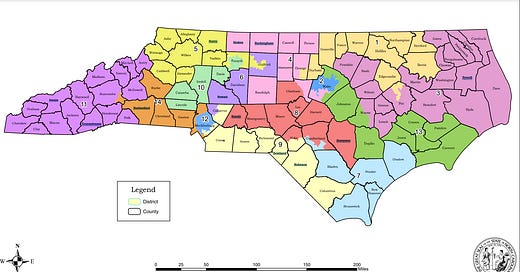
First, I want to thank everyone who has signed up for PoliticsNC on this new platform. I sincerely appreciate those who have become paid subscribers and I welcome those who are new to blog. The launch has been a huge success. I’m still learning how to use it and hope nobody has encountered too many problems.
If you’re a North Carolinian who pays attention to politics, redistricting has been a steady part of you life for the past 40 years or so. While most states draw new districts every ten years, we do it every other year or so. We draw districts and sue and draw districts again. Several of the most important Supreme Court cases addressing redistricting involve North Carolina.
So it’s no surprise that we’re going through the redistricting process again. This time, though, Republicans don’t have much to fear. The U.S. Supreme Court has basically said that redistricting disputes are the purview of the states and they’ve whittled the Voting Rights Act down to nothing. The state Supreme Court is dominated by Republicans who reversed decisions that tried to protect the integrity of our democracy, paving the way for the lopsided maps that the Republican state senate dropped yesterday.
The senate drew two maps, one that’s a solid 11-3 gerrymander and one that gives them 10 solid district and makes one a lean Republican district. In a state where the popular vote is evenly divided, those maps are an insult to democracy. It’s a crucial part of the Republican plan to lock in minority rule.
The maps aren’t just bad for democracy. They are bad for the people who live the districts. Republicans have split up the major cities to water down Democratic votes. In one map, Fayetteville is in a district that includes Nags Head, more than 230 away. Those communities have nothing in common. In another map, booming North Raleigh is paired up with the seaside tourist town of Beaufort, 160 miles away. Republicans clearly ignored any responsibility to focus on communities of interest and instead put a premium on power.
The goal of the GOP redistricting effort is to give Republicans an additional four seats in Congress. They assume that will increase their power in Washington. As we’ve seen this week, though, they will probably just increase their dysfunction and extremism. Once these districts pass, Republican primaries will be the most important elections. In predominantly rural districts, we can expect the most extreme candidates to win. They will elect more people like Madison Cawthorn, Sandy Smith, or Bo Hines because fealty to Trump is more important than any conservative values in the modern GOP.
Legislative districts won’t be much better. Republicans will try to gerrymander themselves veto-proof majorities to offset Democrats’ increasing dominance in gubernatorial elections. The GOP base will likely nominate the most extreme candidates for governor, giving Democrats an advantage among the more moderate swing voters. Veto proof majorities will allow the GOP to impose their will, unchecked by the executive branch and a compliant court.
Unfortunately, with Republican control of the state Supreme Court, Democrats probably don’t have much recourse. The Republicans on the court won’t be a check on legislative power. In addition, the governor has no say in redistricting in North Carolina. The districts will likely pass with no real opposition.
North Carolina Democrats screwed themselves twice in redistricting. They cut the governor out of the redistricting process decades ago when North Carolina was still a one-party state with a very weak governor. They screwed themselves again in the decade leading up to 2010 by not instituting a nonpartisan redistricting commission when they controlled the legislature and governor’s office. Back then, that idea had bipartisan support.
Democrats have two bright spots in the long run. First, the Supreme Court will not always be Republican. As the state very slowly, but surely shifts more Democratic, the party will likely take control of the court sometime in the next decade. Second, as the state grows and suburban districts become more diverse, some of the safe Republican seats will become more competitive.
For now, Democrats need to organize. Electing a Democratic governor in 2024 is more important than ever. The GOP legislative leadership has gotten increasingly arrogant, trying to push through major legislation like casinos that lacks broad support. The court has shown little interest in checking GOP power, so a governor’s veto is the only recourse to slow them down.




